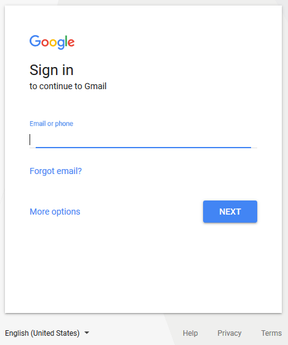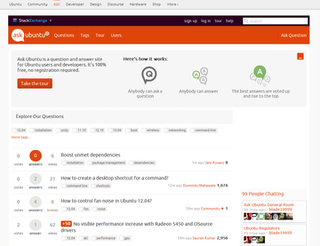
A captive portal is a web page accessed with a web browser that is displayed to newly connected users of a Wi-Fi or wired network before they are granted broader access to network resources. Captive portals are commonly used to present a landing or log-in page which may require authentication, payment, acceptance of an end-user license agreement, acceptable use policy, survey completion, or other valid credentials that both the host and user agree to adhere by. Captive portals are used for a broad range of mobile and pedestrian broadband services – including cable and commercially provided Wi-Fi and home hotspots. A captive portal can also be used to provide access to enterprise or residential wired networks, such as apartment houses, hotel rooms, and business centers.

Gmail is an email service provided by Google. As of 2019, it had 1.5 billion active users worldwide, making it the largest email service in the world. It also provides a webmail interface, accessible through a web browser, and is also accessible through the official mobile application. Google also supports the use of third-party email clients via the POP and IMAP protocols.

StumbleUpon was a browser extension, toolbar, and mobile app with a "Stumble!" button that, when pushed, opened a semi-random website or video that matched the user's interests, similar to a random web search engine. Users were able to filter results by type of content and were able to discuss such webpages via virtual communities and to rate such webpages via like buttons. StumbleUpon was shut down in June 2018.
Anti-phishing software consists of computer programs that attempt to identify phishing content contained in websites, e-mail, or other forms used to accessing data and block the content, usually with a warning to the user. It is often integrated with web browsers and email clients as a toolbar that displays the real domain name for the website the viewer is visiting, in an attempt to prevent fraudulent websites from masquerading as other legitimate websites.
Mozilla Firefox has features which distinguish it from other web browsers, such as Google Chrome, Safari, and Microsoft Edge.

Microsoft Bing, commonly referred to as Bing, is a search engine owned and operated by Microsoft. The service traces its roots back to Microsoft's earlier search engines, including MSN Search, Windows Live Search, and Live Search. Bing offers a broad spectrum of search services, encompassing web, video, image, and map search products, all developed using ASP.NET.

Glitch, Inc. is a software company specializing in project management tools. Its products included project management and content management, and code review tools. Fastly acquired the company in 2022.
A knowledge market is a mechanism for distributing knowledge resources. There are two views on knowledge and how knowledge markets can function. One view uses a legal construct of intellectual property to make knowledge a typical scarce resource, so the traditional commodity market mechanism can be applied directly to distribute it. An alternative model is based on treating knowledge as a public good and hence encouraging free sharing of knowledge. This is often referred to as attention economy. Currently there is no consensus among researchers on relative merits of these two approaches.

The Gmail interface makes Gmail unique amongst webmail systems for several reasons. Most evident to users are its search-oriented features and means of managing e-mail in a "conversation view" that is similar to an Internet forum.

Stack Overflow is a question-and-answer website for computer programmers. It is the flagship site of the Stack Exchange Network. It was created in 2008 by Jeff Atwood and Joel Spolsky. It features questions and answers on certain computer programming topics. It was created to be a more open alternative to earlier question and answer websites such as Experts-Exchange. Stack Overflow was sold to Prosus, a Netherlands-based consumer internet conglomerate, on 2 June 2021 for $1.8 billion.

DuckDuckGo is an American software company that offers a number of products intended to help people protect their online privacy. The flagship product is a search engine that has been praised by privacy advocates. Subsequent products include extensions for popular web browsers and a new web browser.

Posterous was a simple blogging platform started in May 2008. It supported integrated and automatic posting to other social media tools such as Flickr, Twitter, and Facebook, a built-in Google Analytics package, and custom themes. It was based in San Francisco and funded by Y Combinator.
The HTML5 specification introduced the video element for the purpose of playing videos, partially replacing the object element. HTML5 video is intended by its creators to become the new standard way to show video on the web, instead of the previous de facto standard of using the proprietary Adobe Flash plugin, though early adoption was hampered by lack of agreement as to which video coding formats and audio coding formats should be supported in web browsers. As of 2020, HTML5 video is the only widely supported video playback technology in modern browsers, with the Flash plugin being phased out.
Stack Exchange is a network of question-and-answer (Q&A) websites on topics in diverse fields, each site covering a specific topic, where questions, answers, and users are subject to a reputation award process. The reputation system allows the sites to be self-moderating. As of March 2023, the three most actively-viewed sites in the network are Stack Overflow, Unix & Linux, and Mathematics.

Ask Ubuntu is a community-driven question and answer website for the Ubuntu operating system. It is part of the Stack Exchange Network, running the same software as Stack Overflow.
A canonical link element is an HTML element that helps webmasters prevent duplicate content issues in search engine optimization by specifying the "canonical" or "preferred" version of a web page. It is described in RFC 6596, which went live in April 2012.

Google Helpouts was an online collaboration service from Google which launched in November 2013 and allowed users to share their expertise through live video and provide real-time help from their computers or mobile devices. As of April 20, 2015, Google closed Google Helpouts.
PhysicsOverflow is a physics website that serves as a post-publication open peer review platform for research papers in physics, as well as a collaborative blog and online community of physicists. It allows users to ask, answer and comment on graduate-level physics questions, post and review manuscripts from ArXiv and other sources, and vote on both forms of content.
You.com is a personalization-focused search engine. It allows its users to upvote, downvote, or block results. You.com provides additional products, including a chatbot called YouChat, an AI writing tool called YouWrite, and an AI-image generator called YouImagine, which utilizes AI models Stable Diffusion and OpenJourney.











